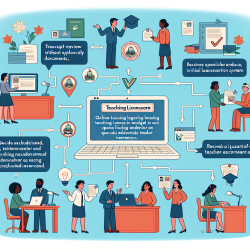Introduction
The COVID-19 pandemic has not only reshaped global health landscapes but also significantly impacted economic and employment structures. A recent study titled "Non-Standard Employment and Unemployment during the COVID-19 Crisis: Economic and Health Findings from a Six-Country Survey Study" provides critical insights into these changes. This research is pivotal for practitioners in the field of online therapy, especially those working with children, as it highlights the importance of adapting therapy strategies to the evolving economic and health contexts.
Understanding the Study
The study explored the links between non-standard employment (NSE), unemployment, and various economic and health outcomes during the pandemic across six countries: Sweden, Belgium, Spain, Canada, the United States, and Chile. It was found that changes in employment arrangements due to COVID-19 were associated with significant shifts in work hours, income, and mental health, particularly anxiety and depression.
Key Findings and Their Implications
- Economic Impact: The pandemic led to decreased work hours and income, especially for those in NSE or who became unemployed. This economic strain can indirectly affect children's mental health and learning environments.
- Mental Health Concerns: Increased levels of anxiety and depression were reported, highlighting the need for mental health support in therapy sessions. This is crucial for children who might be experiencing stress due to changes in their parents' employment status.
- Access to Resources: The provision of personal protective equipment and other safety measures varied, affecting worker safety and well-being. This inconsistency underscores the need for stable support systems in therapy settings.
Enhancing Online Therapy Practices
For practitioners, these findings emphasize the importance of tailoring online therapy approaches to address the broader socio-economic challenges faced by families. Here are some strategies to consider:
- Integrate Mental Health Support: Incorporate strategies to manage anxiety and depression in therapy sessions, recognizing that these issues might stem from economic instability.
- Flexible Scheduling: Offer flexible therapy schedules to accommodate families dealing with fluctuating work hours and economic pressures.
- Resource Sharing: Provide families with information and resources on managing economic stress and accessing mental health support.
Encouraging Further Research
This study is a stepping stone for further research into the impacts of economic changes on therapy outcomes. Practitioners are encouraged to engage with this research and consider conducting their own studies to explore specific impacts on child therapy outcomes.
To read the original research paper, please follow this link: Non-Standard Employment and Unemployment during the COVID-19 Crisis: Economic and Health Findings from a Six-Country Survey Study.










